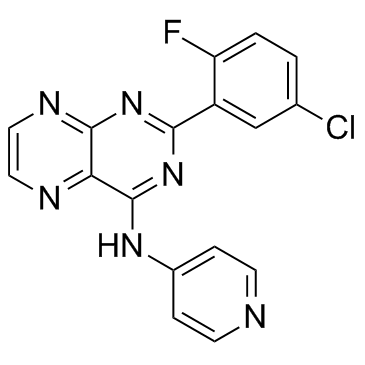SD-208, a novel transforming growth factor beta receptor I kinase inhibitor, inhibits growth and invasiveness and enhances immunogenicity of murine and human glioma cells in vitro and in vivo.
Martin Uhl, Steffen Aulwurm, Jörg Wischhusen, Markus Weiler, Jing Ying Ma, Ramona Almirez, Ruban Mangadu, Yu-Wang Liu, Michael Platten, Ulrich Herrlinger, Alison Murphy, Darren H Wong, Wolfgang Wick, Linda S Higgins, Michael Weller
文献索引:Cancer Res. 64 , 7954-7961 , (2004)
全文:HTML全文
摘要
The cytokine transforming growth factor (TGF)-beta, by virtue of its immunosuppressive and promigratory properties, has become a major target for the experimental treatment of human malignant gliomas. Here we characterize the effects of a novel TGF-beta receptor (TGF-betaR) I kinase inhibitor, SD-208, on the growth and immunogenicity of murine SMA-560 and human LN-308 glioma cells in vitro and the growth of and immune response to intracranial SMA-560 gliomas in syngeneic VM/Dk mice in vivo. SD-208 inhibits the growth inhibition of TGF-beta-sensitive CCL64 cells mediated by recombinant TGF-beta1 or TGF-beta2 or of TGF-beta-containing glioma cell supernatant at an EC(50) of 0.1 mumol/L. SD-208 blocks autocrine and paracrine TGF-beta signaling in glioma cells as detected by the phosphorylation of Smad2 or TGF-beta reporter assays and strongly inhibits constitutive and TGF-beta-evoked migration and invasion, but not viability or proliferation. Peripheral blood lymphocytes or purified T cells, cocultured with TGF-beta-releasing LN-308 glioma cells in the presence of SD-208, exhibit enhanced lytic activity against LN-308 targets. The release of interferon gamma and tumor necrosis factor alpha by these immune effector cells is enhanced by SD-208, whereas the release of interleukin 10 is reduced. SD-208 restores the lytic activity of polyclonal natural killer cells against glioma cells in the presence of recombinant TGF-beta or of TGF-beta-containing glioma cell supernatant. The oral bioavailability of SD-208 was verified by demonstrating the inhibition of TGF-beta-induced Smad phosphorylation in spleen and brain. Systemic SD-208 treatment initiated 3 days after the implantation of SMA-560 cells into the brains of syngeneic VM/Dk mice prolongs their median survival from 18.6 to 25.1 days. Histologic analysis revealed no difference in blood vessel formation, proliferation, or apoptosis. However, animals responding to SD-208 showed an increased tumor infiltration by natural killer cells, CD8 T cells, and macrophages. These data define TGF-beta receptor I kinase inhibitors such as SD-208 as promising novel agents for the treatment of human malignant glioma and other conditions associated with pathological TGF-beta activity.
相关化合物
| 结构式 | 名称/CAS号 | 分子式 | 全部文献 |
|---|---|---|---|
 |
2-(5-氯-2-氟苯基)-N-4-吡啶基-4-蝶啶胺
CAS:627536-09-8 |
C17H10ClFN6 |
|
Inhibition of Transforming Growth Factor-β (TGF-β) Signaling...
2015-08-01 [J. Cell. Biochem. 116 , 1797-805, (2015)] |
|
Differential TGF-{beta} signaling in retinal vascular cells:...
2010-04-01 [Invest. Ophthalmol. Vis. Sci. 51(4) , 1857-65, (2010)] |
|
Progesterone inhibits endometrial cancer invasiveness by inh...
2014-10-01 [Cancer Prev. Res. (Phila.) 7(10) , 1045-55, (2014)] |
|
Differential regulation of TGF-β-induced, ALK-5-mediated VEG...
2015-02-01 [Neuro. Oncol. 17(2) , 254-65, (2015)] |
|
Overexpression of smad7 blocks primary tumor growth and lung...
2014-10-01 [Clin. Cancer Res. 20(19) , 5097-112, (2014)] |